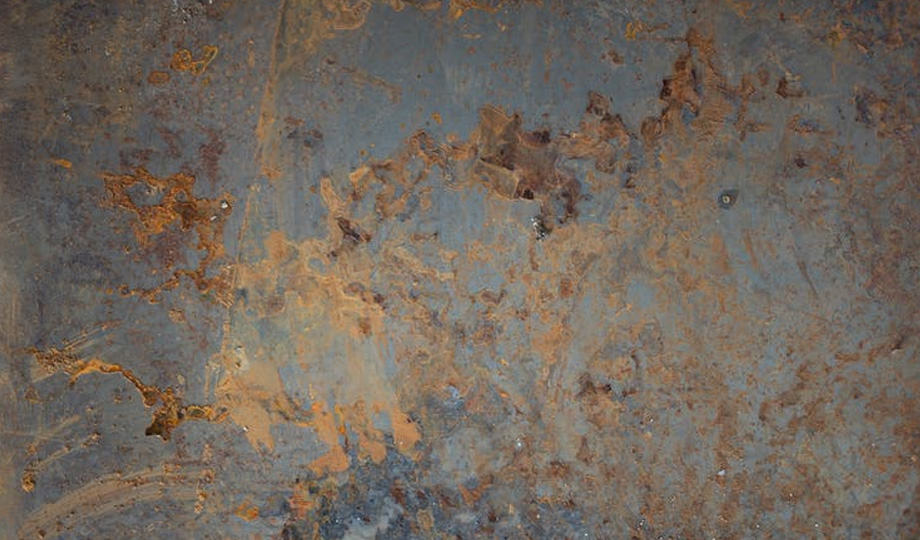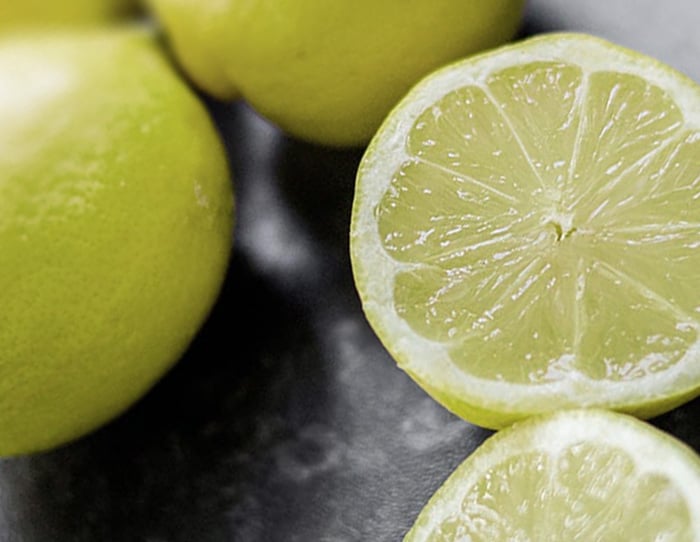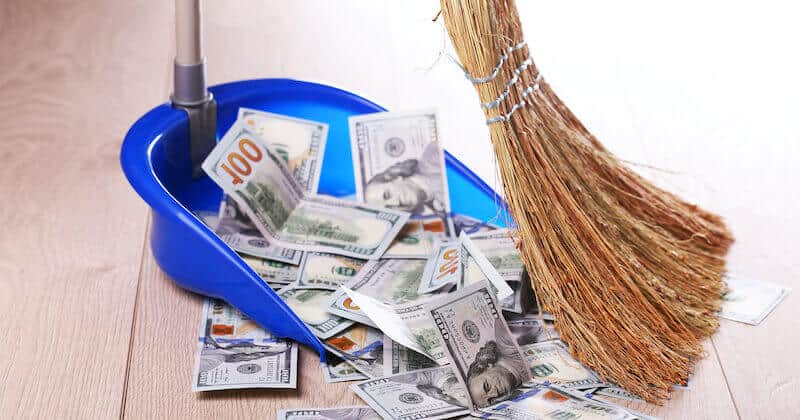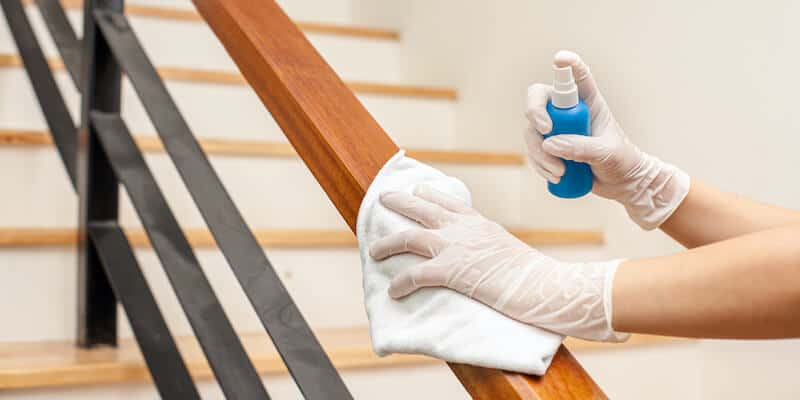
When one sees rust stains appearing on their tiles, what immediately comes to mind is: “Oh no. How do I get rid of it?!” Many times conventional cleaning methods may not yield significant results — and no matter how hard you scrub or how much detergent you use, it may feel like you barely made a dent in your cleaning progress. The only time when you should remove your stained tiles is when the stain has penetrated deep into the tiles, so much so that using any method of cleaning does not make a dent in your cleaning progress. You should first try using a floor cleaning machine, chemicals or cleaning agents on your tiles first. Removing your stained tiles altogether should be regarded as the last resort.

Well, it may seem daunting and even overwhelming to deal with rust stains, but rest assured that there is indeed a way to get around this mess. This article will demonstrate and highlight to you key tips and considerations you can and should keep in mind when you encounter such an issue at your own home.
Consider The Tile Material
As a general rule, try not to leave wet metals on tiles, as they are the primary cause of rust stains. Often times we neglect the fact that different tile materials require different ways of maintaining and cleaning them. This is especially true when it comes to removing stubborn stains like rust.
Keep in mind that there are some tile materials that are more susceptible to being scratched and even having lasting pigments that might not go away. This is particularly true if you employ a cleaning method that does not work well, or is simply not compatible with, the tile that you are removing the rust from.
Though ceramic and porcelain tiles are much more cost-effective and also look as nice and shiny as would marble tiles, these materials are rather porous. What this means is that the material itself sucks any residual water from its surface, in large amounts, making the tiles much more susceptible to rusting than a regular, non-porous tile material.
Nonetheless, you should cease your worries as the upside to these materials is that they are relatively acid-resistant. This means that using strong acids or chemicals will do a good job cleaning the rust from tiles while not leaving any long-lasting damage to your tiles while not leaving any long-lasting damage to your tiles.
Marble tiles are admittedly a little trickier as they do not do well with acidic ingredients and/or products to remove rust stains. This is because the acid will very likely cause irreversible damage to your tiles – which can prove to be a costly mistake as marble is really expensive! You should instead use gentler cleaning agents to solve your rust stain issue!
You Can Use Tomatoes To Remove Rust Stains
For tiles that are resistant to acidic products, experts have found that tomatoes are quite acidic and therefore could potentially be your solution to your rusty issue! All you really have to do is to get yourself a tomato, cut a slice of it, then give the problematic area a good rub with the slice of tomato and sprinkle some rock salt on it afterward. Finish your cleaning job off with a toothbrush by scrubbing the residue away – your tile should be good as new after that! Not only is this method proven to be effective, but it is also one of the most cost-saving methods for cleaning up tough nasty rust stains from your tiles!
The Borax and Lemon Method
The sour taste of limes and lemons is due to the fruits’ high acidic content – this makes it another handy ingredient (or even tool if you will) to remove rust stains from your tiles! Just apply some lemon juice with borax over the affected tile for a while. After a short while, it will dry up and you can begin to scrub the stains off your tiles using either a toothbrush or anything that you can scrub your tiles with. It should come off easily and quickly using this method!
Nonetheless, if the stains are much more stubborn than you have anticipated, then apply citrus juice and salt over the same affected area and let it sit for at least a couple of hours before using a pumice stone to get rid of the rust stains.

Using Baking Soda And Water
This trick is rather simple – all you have to do is to mix some baking soda with some water. When a paste-like texture forms, slather it over the affected areas and cover a layer of cling wrap over it to protect the area for the time being. Afterward, use a less abrasive scraper to remove the residue from your tile and it should be as good as new! This method is highly recommended for tiles that need gentler cleaning methods.
Distilled Water On Tiles
Just simply mix some distilled water and some rust cleaners to form a mixture. Then, apply the mixture over the affected area and cover it up with some plastic wrap for a couple of days. Then when it is ready, clean the mixture from the tile using some water.
Please bear in mind that you should choose rust cleaners that are non-acidic if you are dealing with tiles like marble. This is crucial because anything acidic will cause more harm than good to your marble flooring, potentially leading to costly repairs or replacements!
Rust Remover Commercial Chemicals
Because the rust was not generated by the tiles themselves, a high-strength rust cleaner may be too harsh and cause damage to your tiles especially if they are made of marble. The concept is the same for other tiles made of different materials and the onus is on you to do your research on what you can and cannot use on your tiles to remove rust stains!
We recommend that you use a homemade cleaning solution that is a little gentler on your tiles so that they do not sustain any more harm throughout the cleaning process.
Before spraying, give the bottle a good shake and screw the tip to open it. The spray bottle is more effective and provides for an even distribution of the product. It’ll get you a long way!
“The key to tackling stubborn rust stains on tiles is patience and the right choice of cleaning agent. My personal recommendation is a homemade concoction of lemon juice and baking powder, it has never failed me. The citric acid effectively breaks down the rust while the baking soda abrades it without harming the tile.”
Holden Bartholomew , Adobe Restoration Specialist
Take care of your floor and furniture
In conclusion, removing rust from tiles should not be too tedious a job as there are in fact solutions that will help to solve your rust-related issue. All you really have to do is to be mindful of the tile material that your house has and what sort of cleaning method is suitable for removing rust stains!






I can totally relate to this, as I’ve had this rusty tile issue before and found that a paste of baking soda and water worked wonders for me.
This rust challenge is a common one I’ve faced countless times in my line of work. One solution I’ve found effective is a homemade concoction of white vinegar, baking soda, and a squirt of dish soap. It’s like a magic potion, you mix it together, slather it on the tile, let it do its thing for a few hours and then scrub – works quite brilliantly most times.
That homemade concoction you shared, Leighton, has always come to my rescue too! What I found is that adding a little fresh lemon juice to the mix even boosts its effectiveness. I guess, the citrusy magic is something that stubborn rust can’t handle!
Lemon indeed enhances the effectiveness, Gretchen! The citric acid in it acts as a natural, non-toxic chelating agent, facilitating the breakdown of rust.
Speaking from my knowledge as a former Chemistry teacher, Thalia, you’re on the right track. Citric acid indeed acts as a chelating agent helping break down the rust, but note that its effectiveness can depend heavily on the mineral content of the water you’re using with it.
I agree quite vehemently with you Quentin! The hardness or softness of the water indeed plays a pivotal role when it comes to cleaning rust stains off tiles using citric acid. Back home in Deutschland, we often had hard water that required slightly different techniques for such tasks.
Pavel, I can relate from my own experience of living in hard water areas! But instead of citric acid, I found vinegar to be a more effective solution against rust stains.
Tabby, vinegar can certainly be an effective solution for some forms of rust stains, especially for more surface-level spots. However, from my professional experience, citric acid has proven to be exceptionally good at breaking down more persistent or deeper stains that vinegar might not completely remove. Of course, the effectiveness will also vary depending on the type of tile you’re trying to clean – ceramic tiles might react differently than porcelain or stone ones.
Kingston, you brought up an intriguing point about the varying reactions between different tile types. I agree that citric acid is highly effective for deep-set stains, but it’s crucial to remember that stone tiles can discolour if not rinsed quickly and thoroughly after applying the solution, based on personal experience.